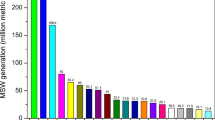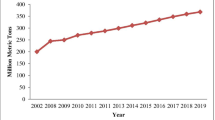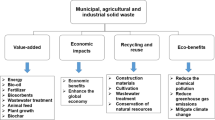Abstract
This study provides an in-depth exploration of the urban municipal solid waste (MSW) collection issue in the urban context, where there is a continuous rise in individual waste production levels and vulnerability to climate change, particularly in developing countries. The research focuses on a specialized vehicle routing model to optimize the solid waste transportation system within the city, aiding civil engineers and urban planners in strategically locating waste collection station positions for efficient waste collection routes. To enhance the model’s efficiency, a novel combined method is proposed, integrating with the Pelican Optimization Algorithm (POA). Experimental evaluations, conducted using real-world data, unequivocally demonstrate that the proposed combined method outperforms alternative approaches, including the current manual MSW collection process in the city. This research makes a significant contribution to the fields of waste management and urban sustainability, with the ultimate goal of mitigating the social, economic, and environmental consequences associated with urban solid waste collection.











Similar content being viewed by others
Data availability
Upon request and contingent on reasonable conditions, the lead author is prepared to share the data, model, or code that form the basis of the study’s findings.
References
Ai, T. J., & Kachitvichyanukul, V. (2009). Particle swarm optimization and two solution representations for solving the capacitated vehicle routing problem. Computers & Industrial Engineering, 56(1), 380–387. https://doi.org/10.1016/j.cie.2008.06.012
Akhtar, M., Hannan, M. A., Begum, R. A., Basri, H., & Scavino, E. (2017). Backtracking search algorithm in CVRP models for efficient solid waste collection and route optimization. Waste Management, 61, 117–128. https://doi.org/10.1016/j.wasman.2017.01.022
Amal, L., Son, L. H., & Chabchoub, H. (2018). SGA: Spatial GIS-based genetic algorithm for route optimization of municipal solid waste collection. Environmental Science and Pollution Research, 25(27), 27569–27582. https://doi.org/10.1007/s11356-018-2826-0
Arvanitis, L. G., Ramachandran, B., Brackett, D. P., Abd-El Rasol, H., & Du, X. (2000). Multiresource inventories incorporating GIS, GPS and database management systems: a conceptual model. Computers and Electronics in Agriculture, 28(2), 89–100. https://doi.org/10.1016/S0168-1699(00)00124-1
Chen, A.-L., Yang, G.-K., & Wu, Z.-M. (2006). Hybrid discrete particle swarm optimization algorithm for capacitated vehicle routing problem. Journal of Zhejiang University-Science A, 7(4), 607–614. https://doi.org/10.1631/jzus.2006.A0607
Czekała, W., Drozdowski, J., & Łabiak, P. (2023). Modern technologies for waste management: a review. Applied Sciences, 13(15), 8847.
Dereci, U., & Karabekmez, M. E. (2022). The applications of multiple route optimization heuristics and meta-heuristic algorithms to solid waste transportation: a case study in Turkey. Decision Analytics Journal, 4, 100113. https://doi.org/10.1016/j.dajour.2022.100113
Dias, J. L., Sott, M. K., Ferrão, C. C., Furtado, J. C., & Moraes, J. A. R. (2021). Data mining and knowledge discovery in databases for urban solid waste management: a scientific literature review. Waste Management & Research, 39(11), 1331–1340. https://doi.org/10.1177/0734242X211042276
Doussoulin, J. P., & Colther, C. (2022). Evaluating the efficiency of municipal solid waste collection services in developing countries: the case of Chile. Sustainability, 14(23), 15887.
Friedlingstein, P., O’Sullivan, M., Jones, M. W., Andrew, R. M., Gregor, L., Hauck, J., Le Quéré, C., Luijkx, I. T., Olsen, A., Peters, G. P., Peters, W., Pongratz, J., Schwingshackl, C., Sitch, S., Canadell, J. G., Ciais, P., Jackson, R. B., Alin, S. R., Alkama, R., … Arora, V. K. (2022). Global carbon budget 2022. Earth System Science Data, 14(11), 4811–4900. https://doi.org/10.5194/essd-14-4811-2022
Gnoni, M., Mummolo, G., & Ranieri, L. (2008). A mixed integer linear programming model for optimisation of organics management in an integrated solid waste system. Journal of Environmental Planning and Management, 51, 833–845. https://doi.org/10.1080/09640560802423756
Hannan, M. A., Akhtar, M., Begum, R. A., Basri, H., Hussain, A., & Scavino, E. (2018). Capacitated vehicle-routing problem model for scheduled solid waste collection and route optimization using PSO algorithm. Waste Management, 71, 31–41. https://doi.org/10.1016/j.wasman.2017.10.019
Hannan, M. A., Arebey, M., Begum, R., & Basri, H. (2011). Radio Frequency identification (RFID) and communication technologies for solid waste bin and truck monitoring system. Waste Management (new York, N.y.), 31, 2406–2413. https://doi.org/10.1016/j.wasman.2011.07.022
Hannan, M. A., Arebey, M., Begum, R., Mustapha, A., & Basri, H. (2013). An automated solid waste bin level detection system using Gabor wavelet filters and multi-layer perception. Resources Conservation and Recycling, 72, 33–42. https://doi.org/10.1016/j.resconrec.2012.12.002
Islam, M., & Rahman, M. (2012). An ant colony optimization algorithm for waste collection vehicle routing with time windows, driver rest period and multiple disposal facilities. https://doi.org/10.1109/ICIEV.2012.6317421
Kaveh, A. (2021). Advances in metaheuristic algorithms for optimal design of structures (3rd ed.). Springer International Publishing. https://doi.org/10.1007/978-3-030-59392-6
Kumar, N., Swamy, C. G., & Nagadarshini, K. N. (2014). Efficient garbage disposal management in metropolitan cities using VANETs. Journal of Clean Energy Technologies, 2, 258–262.
Kumari, M., De, P. K., Chaudhuri, K., & Narang, P. (2023). Utilizing a hybrid metaheuristic algorithm to solve capacitated vehicle routing problem. Results in Control and Optimization, 13, 100292. https://doi.org/10.1016/j.rico.2023.100292
Kuo, R. J., Zulvia, F., & Suryadi, K. (2012). Hybrid particle swarm optimization with genetic algorithm for solving capacitated vehicle routing problem with fuzzy demand—a case study on garbage collection system. Applied Mathematics and Computation, 219, 2574–2588. https://doi.org/10.1016/j.amc.2012.08.092
Lu, X., Pu, X., & Han, X. (2020). Sustainable smart waste classification and collection system: a bi-objective modeling and optimization approach. Journal of Cleaner Production, 276, 124183. https://doi.org/10.1016/j.jclepro.2020.124183
Minamikawa, N. (2024). Geodesic property of greedy algorithms for optimization problems on jump systems and delta-matroids. Discrete Applied Mathematics, 344, 43–67. https://doi.org/10.1016/j.dam.2023.11.003
Pellegrini, M., Aghakhani, A., Guzzini, A., & Saccani, C. (2022). Modification of fraser’s method for the atmospheric CO2 mass estimation by using satellite data. Atmosphere, 13(6), 866.
Perkumienė, D., Atalay, A., Safaa, L., & Grigienė, J. (2023). Sustainable waste management for clean and safe environments in the recreation and tourism sector: a case study of Lithuania, Turkey and Morocco. Recycling, 8(4), 56.
Pham, V. H. S., & Nguyen, V. N. (2023a). Cement transport vehicle routing with a hybrid sine cosine optimization algorithm. Advances in Civil Engineering, 2023, 2728039. https://doi.org/10.1155/2023/2728039
Pham, V. H. S., & Nguyen, N. L. (2023b). Estimating the volume of civil construction materials by machine learning models. Asian Journal of Civil Engineering, 24(7), 2077–2088. https://doi.org/10.1007/s42107-023-00625-1
Pham, V. H. S., Nguyen Dang, N. T., & Nguyen, V. N. (2023a). Hybrid sine cosine algorithm with integrated roulette wheel selection and opposition-based learning for engineering optimization problems. International Journal of Computational Intelligence Systems, 16(1), 171. https://doi.org/10.1007/s44196-023-00350-2
Pham, V.-H.-S., Pham, T.-D., & Nguyen, H.-C.-D. (2022). Optimization of project scheduling under constrained resources using the dependency structure matrix and whale algorithm. Journal of Technology, 37(1), 1–16.
Pham, V. H. S., Trang, N. T. N., & Dat, C. Q. (2023b). Optimization of production schedules of multi-plants for dispatching ready-mix concrete trucks by integrating grey wolf optimizer and dragonfly algorithm. Engineering, Construction and Architectural Management. https://doi.org/10.1108/ECAM-12-2022-1176
Rahman, A., Zlatanova, S., & Pilouk, M. (2008). The 3D GIS Software Development: global efforts from researchers and vendors.
Rahman, M. M., Nguyen, R., Severson, M., Williams, S., & Hartley, D. (2023). A decision support tool for e-waste recycling operations using the hen-and-chicks bio-inspired optimization metaheuristic. Decision Analytics Journal, 7, 100216. https://doi.org/10.1016/j.dajour.2023.100216
Safo-Adu, G., & Owusu-Adzorah, N. (2023). Solid waste characterisation and recycling potential: a study in secondary schools in Kumasi Metropolis, Ghana. Cleaner Waste Systems, 4, 100065. https://doi.org/10.1016/j.clwas.2022.100065
Sanjeevi, V., & Shahabudeen, P. (2015). Optimal routing for efficient municipal solid waste transportation by using ArcGIS application in Chennai, India. Waste Management & Research, 34(1), 11–21. https://doi.org/10.1177/0734242X15607430
Saxena, S., Rajendran, C., Sanjeevi, V., & Shahabudeen, P. (2021). Optimization of solid waste management in a metropolitan city. Materials Today: Proceedings, 46, 8231–8238. https://doi.org/10.1016/j.matpr.2021.03.219
Son, L. H. (2014). Optimizing municipal solid waste collection using chaotic particle swarm optimization in gis based environments: a case study at Danang city, Vietnam. Expert Systems with Applications, 41(18), 8062–8074. https://doi.org/10.1016/j.eswa.2014.07.020
Son, P., & Khoi, L. (2023). Adaptive opposition slime mold algorithm for time–cost–quality–safety trade-off for construction projects. Asian Journal of Civil Engineering, 24, 1927–1942. https://doi.org/10.1007/s42107-023-00612-6
Son, P. V. H., & Lien, P. N. (2022). Blockchain crowdsourced arbitration in construction project delay resolution. Journal of Science and Technology in Civil Engineering (STCE)-HUCE, 16(4), 100–115.
Son, P. V. H., & Nguyen Dang, N. T. (2023a). Optimizing time and cost simultaneously in projects with multi-verse optimizer. Asian Journal of Civil Engineering. https://doi.org/10.1007/s42107-023-00652-y
Son, P. V. H., & Nguyen Dang, N. T. (2023b). Solving large-scale discrete time–cost trade-off problem using hybrid multi-verse optimizer model. Scientific Reports, 13(1), 1987. https://doi.org/10.1038/s41598-023-29050-9
Tavares, G., Zsigraiova, Z., Semiao, V., & Carvalho, M. G. (2009). Optimisation of MSW collection routes for minimum fuel consumption using 3D GIS modelling. Waste Management, 29(3), 1176–1185. https://doi.org/10.1016/j.wasman.2008.07.013
Vivekanand, V., & Prakash, G. S. (2019). Linear programming models in solid waste management studies: literature review. Journal of Solid Waste Technology and Management, 45, 68–75. https://doi.org/10.5276/JSWTM.2019.68
Vu, H. L., Bolingbroke, D., Ng, K. T. W., & Fallah, B. (2019). Assessment of waste characteristics and their impact on GIS vehicle collection route optimization using ANN waste forecasts. Waste Management, 88, 118–130. https://doi.org/10.1016/j.wasman.2019.03.037
Wang, Z., Cheng, J., Fang, H., & Qian, F. (2004). A hybrid optimization algorithm solving vehicle routing problems. Operations Research and Management Science, 13(6), 48–52.
Wu, H., Tao, F., & Yang, B. (2020). Optimization of vehicle routing for waste collection and transportation. International Journal of Environmental Research and Public Health, 17(14), 4963.
Xu, A., Chang, H., Xu, Y., Li, R., Li, X., & Zhao, Y. (2021). Applying artificial neural networks (ANNs) to solve solid waste-related issues: a critical review. Waste Management, 124, 385–402. https://doi.org/10.1016/j.wasman.2021.02.029
Acknowledgements
We acknowledge Ho Chi Minh City University of Technology (HCMUT), VNU-HCM for supporting this study.
Funding
This research did not receive funding from public, commercial, or not-for-profit sector grant agencies.
Author information
Authors and Affiliations
Contributions
All authors, including VHSP and TTV, collaborated equally in composing the main manuscript, preparing all figures and tables, and reviewing and endorsing the final version before submission.
Corresponding author
Ethics declarations
Conflict of interest
The authors affirm that they do not have any conflicts of interest related to the publication of this research article.
Ethical approval
This article does not involve any studies with human participants or animals conducted by any of the authors.
Additional information
Publisher's Note
Springer Nature remains neutral with regard to jurisdictional claims in published maps and institutional affiliations.
Rights and permissions
Springer Nature or its licensor (e.g. a society or other partner) holds exclusive rights to this article under a publishing agreement with the author(s) or other rightsholder(s); author self-archiving of the accepted manuscript version of this article is solely governed by the terms of such publishing agreement and applicable law.
About this article
Cite this article
Pham, V.H.S., Tran, T.V. Optimize the solid waste collection route in construction using the POA algorithm. Asian J Civ Eng 25, 2947–2962 (2024). https://doi.org/10.1007/s42107-023-00955-0
Received:
Accepted:
Published:
Issue Date:
DOI: https://doi.org/10.1007/s42107-023-00955-0




